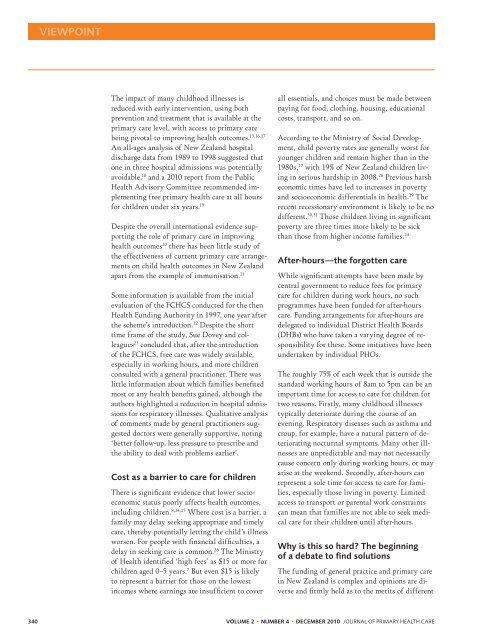The requirement to respect autonomy - The Royal New Zealand ...
The requirement to respect autonomy - The Royal New Zealand ...
The requirement to respect autonomy - The Royal New Zealand ...
- No tags were found...
Create successful ePaper yourself
Turn your PDF publications into a flip-book with our unique Google optimized e-Paper software.
viewpoint<strong>The</strong> impact of many childhood illnesses isreduced with early intervention, using bothprevention and treatment that is available at theprimary care level, with access <strong>to</strong> primary carebeing pivotal <strong>to</strong> improving health outcomes. 15,16,17An all-ages analysis of <strong>New</strong> <strong>Zealand</strong> hospitaldischarge data from 1989 <strong>to</strong> 1998 suggested tha<strong>to</strong>ne in three hospital admissions was potentiallyavoidable, 18 and a 2010 report from the PublicHealth Advisory Committee recommended implementingfree primary health care at all hoursfor children under six years. 19Despite the overall international evidence supportingthe role of primary care in improvinghealth outcomes 20 there has been little study ofthe effectiveness of current primary care arrangementson child health outcomes in <strong>New</strong> <strong>Zealand</strong>apart from the example of immunisation. 21Some information is available from the initialevaluation of the FCHCS conducted for the thenHealth Funding Authority in 1997, one year afterthe scheme’s introduction. 22 Despite the shorttime frame of the study, Sue Dovey and colleagues23 concluded that, after the introductionof the FCHCS, free care was widely available,especially in working hours, and more childrenconsulted with a general practitioner. <strong>The</strong>re waslittle information about which families benefitedmost or any health benefits gained, although theauthors highlighted a reduction in hospital admissionsfor respira<strong>to</strong>ry illnesses. Qualitative analysisof comments made by general practitioners suggesteddoc<strong>to</strong>rs were generally supportive, noting‘better follow-up, less pressure <strong>to</strong> prescribe andthe ability <strong>to</strong> deal with problems earlier’.Cost as a barrier <strong>to</strong> care for children<strong>The</strong>re is significant evidence that lower socioeconomicstatus poorly affects health outcomes,including children. 8,24,25 Where cost is a barrier, afamily may delay seeking appropriate and timelycare, thereby potentially letting the child’s illnessworsen. For people with financial difficulties, adelay in seeking care is common. 26 <strong>The</strong> Ministryof Health identified ‘high fees’ as $15 or more forchildren aged 0–5 years. 7 But even $15 is likely<strong>to</strong> represent a barrier for those on the lowestincomes where earnings are insufficient <strong>to</strong> coverall essentials, and choices must be made betweenpaying for food, clothing, housing, educationalcosts, transport, and so on.According <strong>to</strong> the Ministry of Social Development,child poverty rates are generally worst foryounger children and remain higher than in the1980s, 27 with 19% of <strong>New</strong> <strong>Zealand</strong> children livingin serious hardship in 2008. 28 Previous harsheconomic times have led <strong>to</strong> increases in povertyand socioeconomic differentials in health. 29 <strong>The</strong>recent recessionary environment is likely <strong>to</strong> be nodifferent. 30,31 Those children living in significantpoverty are three times more likely <strong>to</strong> be sickthan those from higher income families. 24After-hours—the forgotten careWhile significant attempts have been made bycentral government <strong>to</strong> reduce fees for primarycare for children during work hours, no suchprogrammes have been funded for after-hourscare. Funding arrangements for after-hours aredelegated <strong>to</strong> individual District Health Boards(DHBs) who have taken a varying degree of responsibilityfor these. Some initiatives have beenundertaken by individual PHOs.<strong>The</strong> roughly 75% of each week that is outside thestandard working hours of 8am <strong>to</strong> 5pm can be animportant time for access <strong>to</strong> care for children fortwo reasons. Firstly, many childhood illnessestypically deteriorate during the course of anevening. Respira<strong>to</strong>ry diseases such as asthma andcroup, for example, have a natural pattern of deterioratingnocturnal symp<strong>to</strong>ms. Many other illnessesare unpredictable and may not necessarilycause concern only during working hours, or mayarise at the weekend. Secondly, after-hours canrepresent a sole time for access <strong>to</strong> care for families,especially those living in poverty. Limitedaccess <strong>to</strong> transport or parental work constraintscan mean that families are not able <strong>to</strong> seek medicalcare for their children until after-hours.Why is this so hard? <strong>The</strong> beginningof a debate <strong>to</strong> find solutions<strong>The</strong> funding of general practice and primary carein <strong>New</strong> <strong>Zealand</strong> is complex and opinions are diverseand firmly held as <strong>to</strong> the merits of different340 VOLUME 2 • NUMBER 4 • DECEMBER 2010 J OURNAL OF PRIMARY HEALTH CARE
















